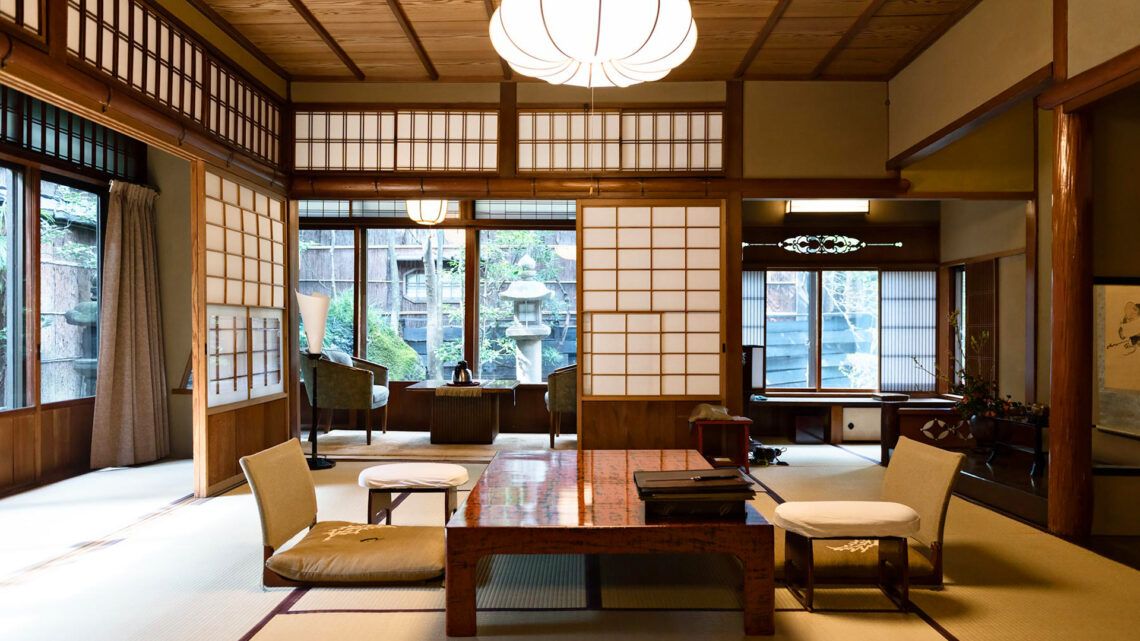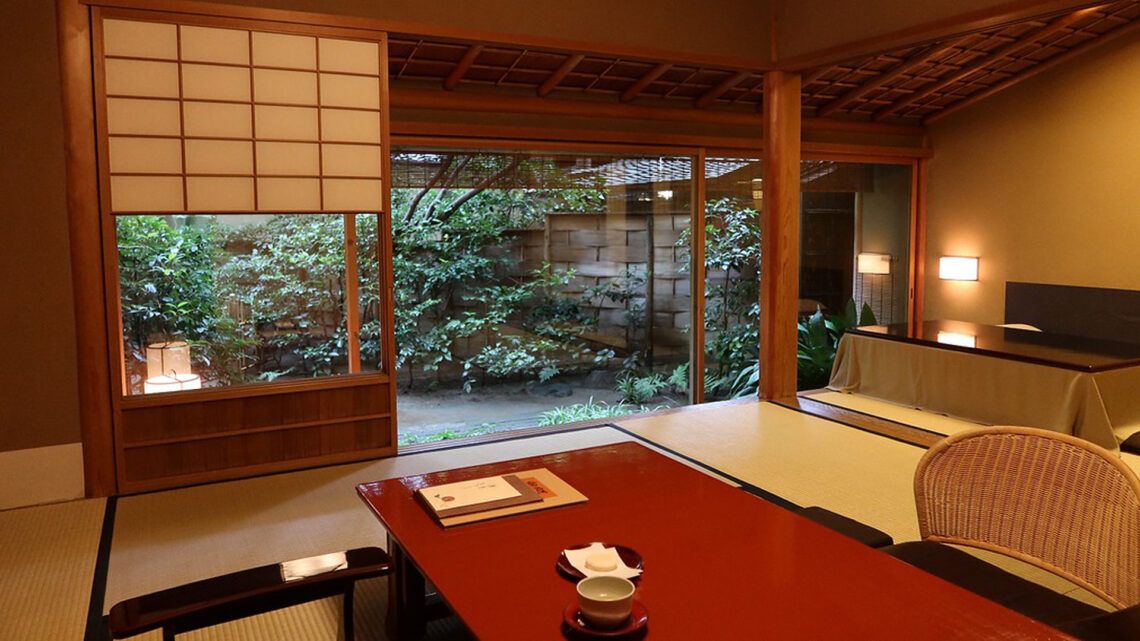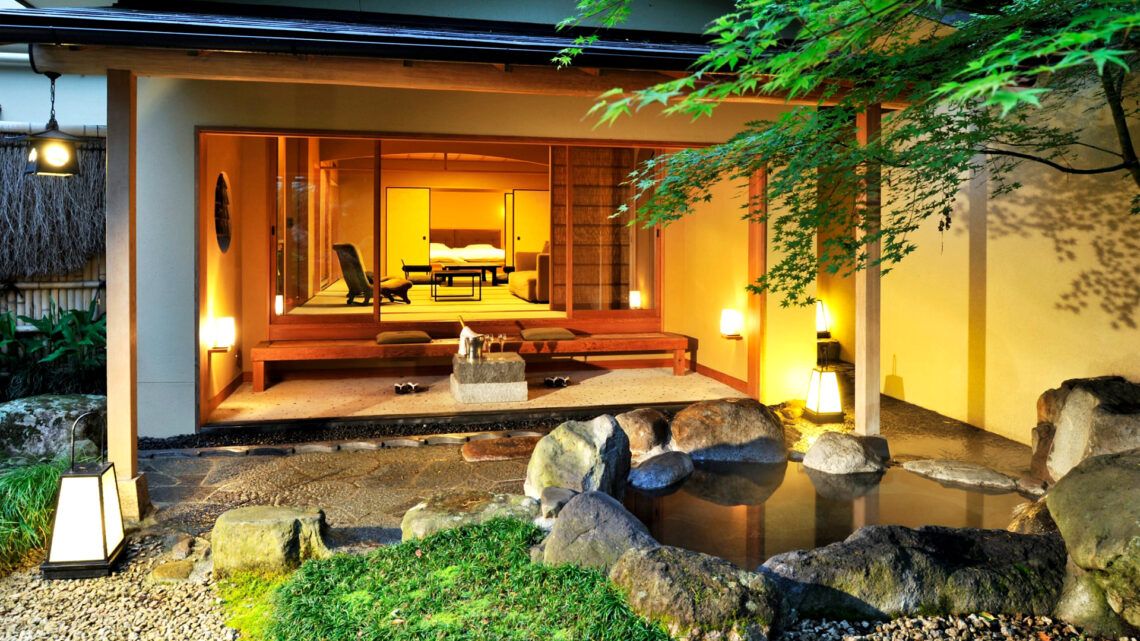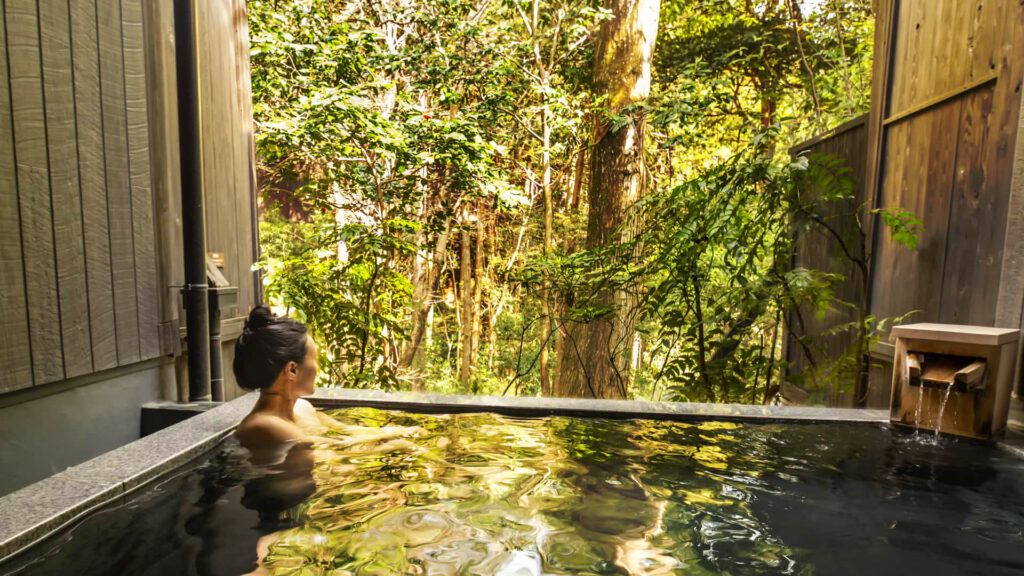
Pure Relaxation: Hakone Onsen in Kanagawa
Hakone Onsen in Kanagawa is a true gem of relaxation, nestled in the picturesque landscape of the Hakone Mountains. This idyllic retreat not only offers an escape from the hustle and bustle of everyday life but also an unparalleled experience for all the senses. Immerse yourself in the world of purifying hot springs, surrounded by lush greenery and the soothing sound of clear water.
The origins of Hakone Onsen trace deep into Japan’s history, and to this day, it preserves the tradition of Japanese bathing culture. The springs, fed by volcanic activities in the region, promise not only physical but also spiritual renewal. Those who visit this place seek not only to relax their tired muscles but also to clear their minds and sharpen their senses.
The architecture of Hakone Onsen seamlessly blends into the natural surroundings. Wooden buildings with traditional sliding doors open to gardens adorned with intricately pruned bonsai trees and azure ponds. Every detail has been carefully considered to create an atmosphere of tranquility. Indoors exude a subtle elegance, calming the senses and preparing guests for the upcoming wellness experience.
The selection of baths at Hakone Onsen is impressive. From outdoor pools overlooking majestic mountains to private onsens for a more intimate experience—every guest finds their personal paradise of relaxation. Some pools are enriched with minerals that pamper the skin and possess healing properties. Water temperatures vary from warm and soothing to hot and revitalizing, allowing visitors to find their own comfort zone.
The art of the traditional tea ceremony is as present in Hakone Onsen as the thermal springs themselves. In the quiet corners of the complex, guests can participate in a ceremony where every gesture and sip carries meaning. It’s an opportunity to indulge not only the palate but also to immerse oneself in the rich culture of Japan.
The tranquility is only interrupted by the gentle rustling of the wind and the chirping of birds. Guests can recline in relaxation areas, enveloped in soft kimonos, leaving the stresses of daily life behind. Whether on comfortable loungers or in traditional tatami rooms, the atmosphere is characterized by unobtrusive luxury.
The culinary experiences at Hakone Onsen are equally impressive. The cuisine blends traditional Japanese flavors with modern sophistication. Fresh ingredients from the region are expertly crafted into delicious dishes that please not only the palate but also the eyes. From sushi and tempura to delicate desserts—here, dining becomes a sensual delight.
Accommodations at Hakone Onsen are as diverse as the guests’ needs. From stylish rooms with panoramic views to traditional ryokans with tatami mats and futons—everyone finds their personal sanctuary. The rooms are equipped with fine details, from handmade artworks to calming color schemes that create an atmosphere of comfort.
In this little piece of heaven on earth, Hakone Onsen in Kanagawa, guests experience not only pure relaxation but also a journey to themselves. It’s a place where time seems to stand still, and nature touches the soul in all its beauty. A visit to Hakone Onsen is more than just a wellness getaway—it’s an unforgettable experience that harmonizes body, mind, and soul.
The History of Hakone Onsen
The origins of Hakone Onsen reach far back to the Edo period (1603-1868), when the hot springs were first discovered by travelers. It is said that a Buddhist monk named Mokubo, seeking a cure for his illness, discovered the healing powers of the springs. This discovery spread quickly, and people from various parts of Japan began to travel to Hakone to experience the therapeutic properties of the water.
Over time, Hakone evolved into a retreat for scholars, artists, and nobility, who sought not only the health benefits of the hot springs but also enjoyed the picturesque beauty of the surrounding nature. During this time, the first ryokans, traditional Japanese inns, emerged, clustering around the hot springs and providing accommodation and meals to visitors.
In the Meiji era (1868-1912), Hakone experienced another surge. Japan’s modernization led to improved infrastructure, including railways and roads, making access to Hakone easier. The popularity of onsen grew, leading to the construction of more bathhouses and ryokans to accommodate the growing influx of visitors.
In the 1920s, Hakone became a hotspot for artists and intellectuals who appreciated the combination of natural beauty and cultural atmosphere. The thermal springs became a symbol of relaxation and inspiration. Renowned writers such as Natsume Soseki and Akutagawa Ryuunosuke spent time in Hakone, finding the necessary tranquility to create masterpieces.
During World War II, like many places in Japan, Hakone suffered significant damage. The hot springs and facilities were neglected, but the local community worked hard to rebuild the area after the war. In the following decades, Hakone experienced a tourist renaissance and became a popular destination for both domestic and international travelers.
The modern era of Hakone Onsen is characterized by a blend of tradition and innovation. While many ryokans have preserved their traditional atmosphere, modern spa resorts have also emerged, offering luxury and comfort. The hot springs themselves remain the centerpiece of the experience, with various bathhouses providing different mineral compositions and temperatures.
Hakone is not just a place of relaxation but also a cultural treasure reflecting Japan’s history. The ancient cedar forests, the majestic Mount Fuji in the distance, and the picturesque streets of Hakone contribute to creating an atmosphere of serenity that extends beyond the hot springs.
In recent years, Hakone has also established itself as an art center, with museums and galleries housing both modern and traditional artworks. This contributes to positioning Hakone as a holistic cultural experience that heals not only the bodies but also the spirits of visitors.
The hot springs, once discovered by Mokubo, have become a symbol of the deep connection between humans and nature, continuing to attract those seeking relaxation and inspiration. Hakone remains a jewel of Japan, where past and present harmoniously merge.
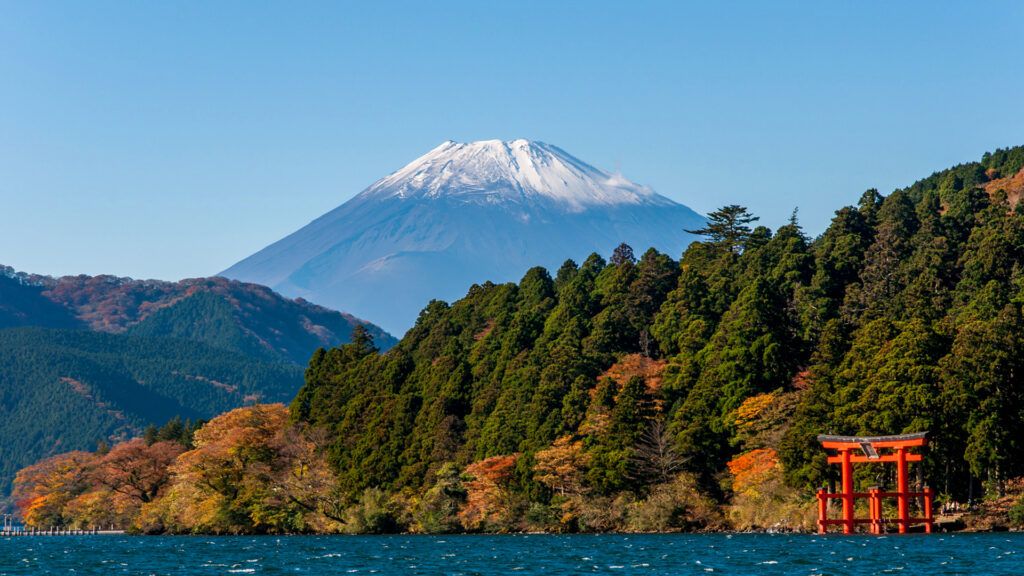
The Surroundings of Hakone Onsen
The surroundings of Hakone Onsen in Kanagawa captivate with a blend of natural beauty, cultural richness, and a relaxed atmosphere. This idyllic piece of Japan not only offers the healing powers of hot springs but also an abundance of attractions that appeal to the senses.
A highlight of the area is the famous Hakone National Park, spanning over 120 square kilometers and providing an impressive variety of landscapes. From the summit of Mount Hakone, there is a breathtaking view of Mount Fuji, Japan’s highest peak, majestically towering on the horizon. Hikers can stroll through dense forests on winding paths leading to hidden temples and feel the refreshing breeze from the surrounding lakes.
Lake Ashi, one of the gems of the national park, reflects the surrounding mountains and sky in its tranquil waters. Along the shore winds a picturesque road lined with shops offering regional delicacies. Here, one can immerse themselves in traditional craft shops, taste local delights, or simply enjoy the idyllic panorama.
Not far away is the Hakone Open Air Museum, a unique outdoor art gallery integrating modern sculptures into a lush garden landscape. Visitors can wander among artworks standing in the open air, experiencing the harmony of nature and art.
The streets of Hakone also host numerous historical sites to discover. Hakone Castle, a reconstructed structure from the 17th century, tells the fascinating history of Japan. The castle sits atop a hill, providing not only a glimpse into the past but also a breathtaking view of the surrounding landscape.
However, the surroundings of Hakone Onsen offer not only cultural and natural treasures but also a culinary adventure. The region is known for its Black Egg delicacy, where eggs are cooked in the hot springs, taking on a distinctive color. Strolling through the lanes of Hakone lets the nose revel in the scents of local specialties such as Yuba (tofu skin), Kuro Goma (black sesame), and Manju (steamed dumplings).
Accommodations in Hakone reflect the diversity of the region. Traditional ryokans, Japanese inns, not only provide comfortable lodgings but also the opportunity to experience authentic Japanese living. Guests can stay in tatami-mat rooms, don Yukata (light cotton kimonos), and savor Kaiseki (an art form of dining encompassing a variety of seasonal ingredients).
The modern side of Hakone is evident in luxurious resorts boasting top-notch amenities and services. Many of these resorts offer private onsen baths, from which one can admire the natural scenery while relaxing in the warm waters.
In the colder months, when snow enchants the landscape, Hakone transforms into a romantic winter paradise. The hot springs then provide particularly welcome warmth as the snow gently falls to the ground.
In summary, the surroundings of Hakone Onsen in Kanagawa are a symphony of nature, culture, and relaxation. This picturesque region not only offers an escape from the hustle and bustle of everyday life but also the opportunity to experience the beauty of Japan in all its facets. Hakone is not just a place for rejuvenating baths but also a place for inspiring experiences and unforgettable moments.
A Paradise for Relaxation Seekers
Hakone Onsen is not just a hot spring; it is a paradise for relaxation seekers. The healing properties of the thermal waters melt away the stress of daily life, immersing you in a state of profound tranquility.
Nestled in the picturesque hills of Kanagawa lies a true haven for relaxation seekers – Hakone Onsen. This enchanting region is renowned not only for its breathtaking nature but also for its traditional hot springs that have attracted seekers of serenity from around the world for centuries. Immerse yourself in the fascinating world of Hakone Onsen and discover the harmonious connection of nature, culture, and well-being.
The journey to Hakone often begins with a scenic train ride, leaving behind the urban landscapes of Tokyo and entering lush forests and mountain peaks. The crisp mountain air and the sight of the majestic Mount Fuji on the horizon promise a respite from the hustle and bustle of everyday life.
Upon reaching the gates of Hakone, one is enveloped in an aura of serenity. The grounds are crisscrossed with walking paths meandering through dense forests, leading to hidden vantage points. Birds sing in harmony with the babbling of streams, and the world seems to move in a gentle rhythm.
The onsens of Hakone are undoubtedly the main attraction of this oasis of relaxation. Nestled in ryokans, traditional Japanese inns, these natural hot springs provide visitors with the opportunity to immerse themselves in healing warmth. The mineral-rich water bubbling from the depths of the earth promises not only physical but also mental rejuvenation.
The selection of ryokans in Hakone is diverse, catering to every taste and budget. Many of these inns are true masterpieces of traditional Japanese architecture, featuring tatami mats, shoji sliding doors, and Zen gardens that create an atmosphere of tranquility. Guests are not only immersed in the rich culture of Japan but can also experience the famous Japanese hospitality.
The onsen experience itself is a cultural ceremony. Before immersing oneself in the soothing water, thorough cleansing is required to preserve the purity of the bathing experience. The view of the surrounding nature, whether a blooming garden or a mountain vista, enhances the relaxing effect and fades away the stresses of daily life.
Away from the hot springs, Hakone has many more treasures to offer. For example, the Hakone Open-Air Museum combines art and nature in a unique way. Sculptures by renowned artists are exhibited outdoors, and visitors can stroll between art and landscape, creating a harmonious dialogue between humanity and the environment.
Another highlight is a visit to the Hakone Shrine, hidden deep in the woods. The red torii gates provide a contrasting counterpoint to the green surroundings, imparting a spiritual atmosphere to the place. It is a sanctuary of silence and prayer, creating a connection to nature and the soul.
Hakone’s culinary scene is also worth exploring. Traditional kaiseki dishes, consisting of a variety of delicately prepared small courses, are served in ryokans, offering insight into the sophistication of Japanese cuisine. Local specialties, such as the famous black egg cooked in the hot springs, rumored to add seven years to one’s life, invite culinary adventures.
The seasons shape the face of Hakone, giving the region a unique charm at any time of the year. In spring, cherry blossoms bloom in delicate shades of pink and white, while autumn bathes the hills in a sea of red, orange, and yellow. Winter blankets the landscape in a quiet stillness, only interrupted by the crunching of snow underfoot.
In conclusion, it can be said that Hakone Onsen is not just a destination; it is a journey into another world. It is a place where time seems to stand still, and nature merges with culture. The hot springs, the artful ryokans, the spiritual sites, and the delicious cuisine create an experience that indulges both body and soul. Hakone Onsen is undoubtedly a paradise for relaxation seekers, a place that enchants the senses and creates lasting memories.
Accommodations nearby
The selection of hotels in Hakone Onsen is as diverse as the surrounding landscape. From traditional ryokans to modern luxury resorts, these accommodations offer a wide range of experiences to cater to various preferences. One outstanding feature of Hakone Onsen hotels is undoubtedly the integration of natural hot springs into the facilities.
Some of the most exquisite ryokans that Hakone has to offer combine the authenticity of Japanese culture with modern comfort. Rooms, furnished with tatami mats and shoji sliding doors, not only provide views of the surrounding nature but also offer access to private onsen baths – a truly luxurious experience. The warm thermal spring waters, fed by the volcanoes in the region, promise not only physical but also spiritual renewal.
For those seeking a touch of international flair, there are also modern hotels available that seamlessly blend into the natural scenery. Spacious rooms with panoramic windows offer an unparalleled view of Mount Fuji and the surrounding national park. Amenities range from upscale restaurants celebrating fine local cuisine to wellness spas pampering guests with traditional and modern therapies.
The Hakone region is renowned not only for its natural treasures but also for its cultural attractions. Therefore, many hotels not only provide comfortable accommodations but also offer cultural programs and activities. From tea ceremonies to kimono events and ikebana workshops, guests have the opportunity to immerse themselves deeply in the fascinating world of Japanese culture.
A particular highlight is the diversity of culinary experiences offered in Hakone Onsen hotels. From traditional kaiseki menus to internationally inspired dishes, the restaurants cover a broad spectrum. The use of fresh, local ingredients not only imparts exquisite flavors to the dishes but also adds a regional authenticity.
Beyond the hotel premises, Hakone offers a wealth of activities for both adventure enthusiasts and those interested in culture alike. From the famous Hakone Open-Air Museum and Lake Ashi to the historic Hakone Shrine, there are countless attractions to explore. The hotels not only serve as comfortable bases but also as sources of knowledge for discovering the hidden treasures of the region.
The diversity of hotels in Hakone Onsen reflects the uniqueness of this region. Whether you’re looking for a retreat to escape the everyday or a base for exploring Hakone’s treasures, you’ll undoubtedly find the perfect accommodation here. The hotels in Hakone Onsen in Kanagawa Prefecture are more than just places to stay; they are gateways to a world of relaxation, culture, and unforgettable experiences. Let yourself be captivated by the magic of Hakone and discover a side of Japan that touches the heart and soul.
The natural healing powers of Hakone Onsen
The natural healing powers of Hakone Onsen have been a fascinating phenomenon for centuries, drawing people from all over the world. Nestled in the picturesque mountains of Hakone, surrounded by lush forests and fragrant flowers, this source of natural healing extends in all its glory. The geothermal activity in this region has created a unique combination of minerals that gives Hakone Onsen its therapeutic properties.
A relaxing soak in the hot springs of Hakone is not just a physical experience but also a spiritual journey. The warm, mineral-rich water has the power to soothe the senses and revitalize the mind. The healing effect of the springs is often described as a form of natural meditation, allowing visitors to shake off the stress of modern life and immerse themselves in a deep, soothing calm.
The minerals found in Hakone’s springs are diverse and play a crucial role in promoting health. Sulfur, known for its anti-inflammatory properties, alleviates joint pain and improves skin health. Calcium and magnesium contribute to the strengthening of bones and muscles, while sodium promotes circulation and regulates blood pressure.
Hakone Onsen is more than just a place of physical healing; it is also a place of spiritual renewal. The serene environment, away from the hustle and bustle of the city, provides the ideal space for meditation and contemplation. Many visitors report a deep inner peace experienced after a visit to Hakone’s hot springs and an enhanced sense of well-being that lingers long after their departure.
The tradition of onsen bathing in Hakone dates back extensively and is closely tied to Japanese culture. Locals view bathing in the hot springs not only as a purely physical activity but also as a way to cleanse the body and mind. The respectful interaction between humans and nature is celebrated here, encouraging visitors to feel a deep connection with the surroundings.
The various onsen baths in Hakone offer a variety of experiences. From open-air pools with breathtaking views of the surrounding nature to traditional indoor baths adorned with intricate tiles and carvings, each place has its own charm and unique atmosphere. Some of the springs are even integrated into traditional Ryokan inns to provide guests with an authentic experience.
The healing powers of Hakone Onsen extend beyond the physical aspect. Many visitors report increased mental clarity and a sense of detoxification after their stay. The environment, nestled in the picturesque hills and forests, enhances this effect. The fresh mountain air, the gentle rustling of trees, and the babbling water of the springs create a harmonious backdrop that invigorates the senses.
It’s also interesting to note that Hakone Onsen offers different charms not only seasonally but also at different times of the day. The early morning hours can be a particularly peaceful time, with mist still hanging over the mountain peaks, bathing the world in gentle light. Sunset, on the other hand, bathes the landscape in warm colors, creating a romantic atmosphere.
The local community of Hakone is committed to preserving and protecting the natural healing powers of their springs. Environmentally friendly practices and sustainable approaches are encouraged to ensure that these valuable resources are preserved for future generations. The protection of nature is an integral part of the philosophy that shapes Hakone Onsen.
Overall, Hakone Onsen is not just a place of physical relaxation but a sacred sanctuary for the body, mind, and soul. The magic of these natural springs lies not only in their healing properties but also in the deep connection to nature and the long, respectful history that surrounds them. A visit to this picturesque piece of heaven on earth promises not only rejuvenation but also a transformative journey to the roots of one’s own existence.
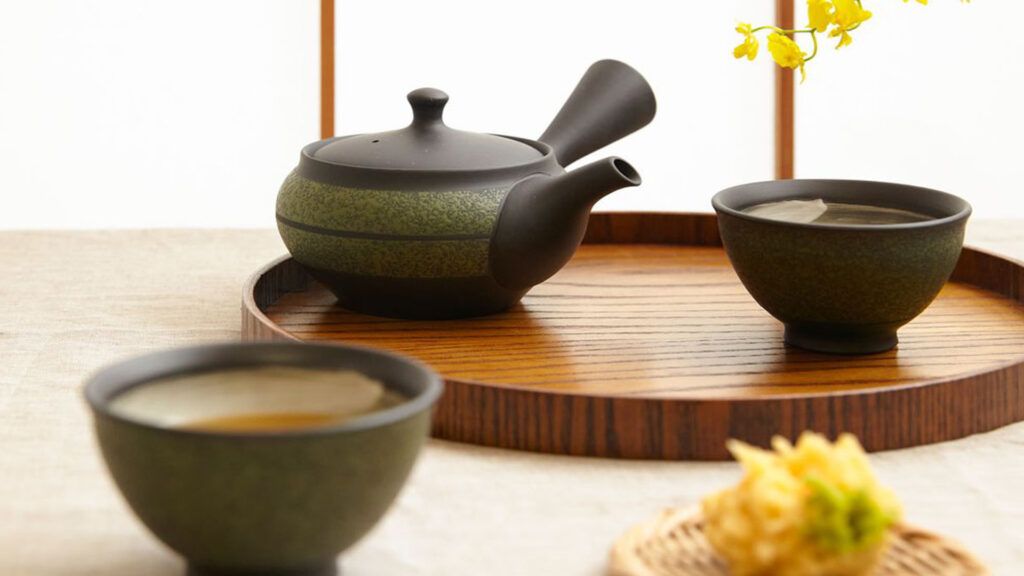
Certain rules and etiquette in a japanese Onsen
Bathing in a Japanese onsen is not only a cleansing physical experience but also a journey into the deep-rooted traditions and rules of Japanese culture. These warm springs, emerging amidst picturesque landscapes, offer not just relaxation but also insights into the etiquette that visitors are expected to respect.
Before immersing oneself in the warm, soothing water, there are some basic guidelines to consider. Firstly, it’s crucial to take a thorough shower before entering the onsen. This is required not just for hygiene reasons but also as a ritual cleansing to rid the body of external influences. Shower areas typically have low stools and hand showers to facilitate this process.
While showering, it’s advisable to wash thoroughly and ensure no soap or shampoo enters the actual onsen water. These clear springs are to be preserved in their pure form, and the use of soap or other cleansers in the pool itself is strictly prohibited.
Another important point is the removal of jewelry and tying up of hair. Jewelry can not only be damaged but could also affect the water of the onsen. Long hair should be neatly tied to prevent it from touching the water and compromising the purity of the onsen.
It’s also customary to leave towels outside the actual bathing area. Small towels, however, can be used to maintain privacy by holding them in strategically placed areas. Bringing large towels into the water is usually not allowed.
Upon entering the onsen, it’s important to do so quietly and respectfully. Loud talking or splashing in the water is considered impolite. The atmosphere is designed to calm the senses and create a peaceful environment for guests to relax.
It’s advisable not to immerse the face directly in the water and not to wash the hair to preserve the purity of the onsen. Photography is usually not allowed to respect the privacy of other guests.
The times when men and women can use the onsen may vary. In many facilities, there are separate areas for men and women, while in some cases, there may be specific times for mixed use. Respecting these schedules is important to avoid uncomfortable situations.
After leaving the onsen, it’s customary to shower again to remove any residues before leaving the bathing area. This step serves not only personal cleanliness but also protects other guests from possible contaminants.
The rules in a Japanese onsen may seem complex at first glance, but they aim to preserve traditional principles of purity, politeness, and respect in a communal environment. These rules are not just regulations but part of a larger cultural heritage that captures the essence of the Japanese lifestyle.
Your Candahashi

